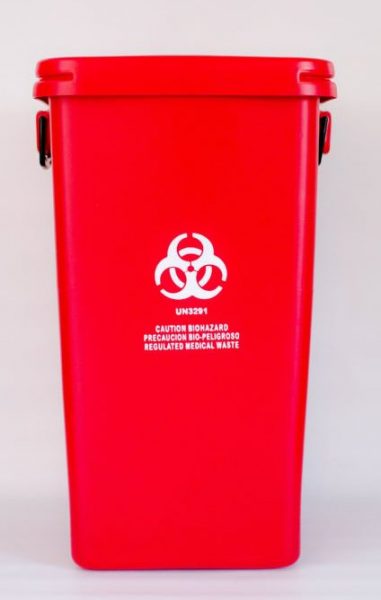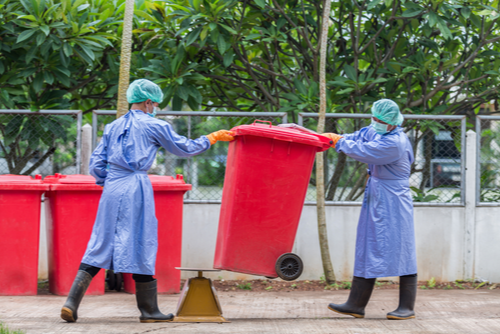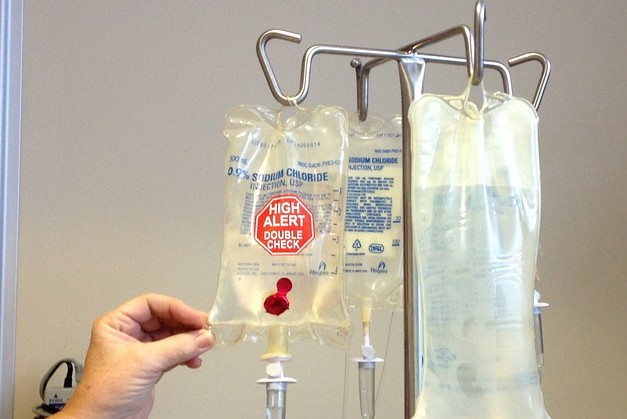Proactive Health Solutions: Choosing the very best Medical Waste Removal Near You
Stay Ahead of Laws: Specialist Advice on Medical Waste Disposal
In a globe where the healthcare industry is frequently advancing, it is essential for medical centers to stay ahead of guidelines when it comes to the correct disposal of clinical waste. From recognizing the different categories of medical waste to carrying out the ideal collection and partition techniques, this discussion will certainly offer actionable ideas and important understandings to assist centers stay in advance of guidelines in the ever-changing landscape of medical waste disposal.
Comprehending Medical Waste Categories
Comprehending medical waste classifications is important for correct disposal and administration in medical care facilities. Clinical waste refers to any type of waste created by healthcare tasks that may present a threat to public health and wellness or the environment. It is important to classify medical waste precisely to guarantee its safe handling, therapy, transportation, and disposal.
There are numerous categories of medical waste that medical care centers need to be acquainted with. One of the most usual categories include contagious waste, pathological waste, sharps waste, pharmaceutical waste, and chemical waste. Each group has specific guidelines and regulations for its proper management and disposal.
Contagious waste consists of products contaminated with blood or other bodily fluids, such as gloves, dress, and research laboratory cultures. Pathological waste refers to human cells, body organs, or body components that require special handling and disposal. Sharps waste includes utilized needles, syringes, and other sharp items that can trigger injury and send infections. Drug waste comprises ended, unused, or polluted medications that require mindful handling and disposal. Lastly, chemical waste includes solvents, disinfectants, and other chemical substances made use of in health care centers.
Remaining Up-To-Date With Regulatory Adjustments
Remaining present with regulative modifications is vital for health care facilities to guarantee compliance and correct monitoring of clinical waste disposal. medical waste removal service. With policies constantly advancing, it is crucial for health care facilities to remain updated to avoid fines, penalties, and potential injury to the atmosphere and public health
To remain ahead of regulatory changes, health care facilities must establish a system for surveillance and tracking updates. This can be done by subscribing to governing newsletters, participating in seminars and workshops, and proactively joining market associations. In addition, facilities need to assign an employee or group accountable for remaining notified and sharing info to pertinent stakeholders.
Regular interaction with regulatory firms is also crucial. Healthcare centers should develop relationships with regional, state, and government agencies to ensure they understand any adjustments in policies that might influence their waste administration techniques. This can be done through normal conferences, involvement in public remark periods, and aggressive engagement with regulative firms.
Moreover, healthcare facilities should take into consideration partnering with waste management companies that specialize in clinical garbage disposal (medical waste disposal services with WasteX). These business are frequently skilled in the current guidelines and can give support and assistance to make sure conformity
Executing Proper Collection and Segregation Techniques
To properly manage clinical garbage disposal, medical care centers should establish appropriate collection and partition approaches in accordance with governing standards. Applying these approaches makes certain the safe handling and disposal of possibly unsafe products, shields the setting, and lessens the threat of injuries and infections to medical care employees and the public.
Appropriate collection and partition methods include the use of designated containers and identifying systems. Healthcare facilities need to give her explanation plainly identified containers for different kinds of clinical waste, such as sharps, contagious waste, pharmaceutical waste, and non-hazardous waste. These containers ought to be color-coded and clearly significant to prevent confusion and advertise very easy identification.
Additionally, medical care centers must train their team on the right procedures for collecting and setting apart clinical waste. This includes enlightening them on the various kinds of waste, the appropriate containers to make use of, and the value of complying with guidelines and regulations. Regular training sessions and refresher course courses should be performed to guarantee that personnel stay up-to-date on best techniques.
Moreover, healthcare centers ought to develop a system for routine collection and disposal of clinical waste. This may entail partnering with accredited waste management firms that concentrate on medical garbage disposal. These companies will certainly ensure that the accumulated waste is delivered and thrown away in compliance with regulative requirements.
Selecting the Right Disposal Approaches

Incineration is just one of the most efficient and usual methods for disposing of certain sorts of medical waste, such as pathological waste and sharps. It includes the controlled combustion of waste at heats, minimizing it to ash. Incineration can launch unsafe toxins right into the air and add to air pollution.

Chemical therapy involves the use of chemicals to sanitize and reduce the effects of the waste. Microwave therapy makes use of microwave power to heat and disinfect the waste.
Guaranteeing Compliance With Documents and Training
After meticulously taking into consideration the appropriate disposal methods for medical waste, healthcare centers have to guarantee compliance with policies and minimize environmental impact by implementing effective documents and training treatments. This action is vital in keeping a secure and lasting environment for both medical waste disposal services with WasteX healthcare workers and the basic public.

Training is equally vital in ensuring compliance with guidelines. Healthcare workers who take care of medical waste ought to get ideal training on waste partition, dealing with, and disposal treatments. This training needs to cover subjects such as the proper use personal protective devices, recognition of various kinds of waste, and the correct disposal techniques for every waste classification. By giving comprehensive training, healthcare facilities can empower their personnel to make educated decisions and lessen the danger of incorrect garbage disposal.
Conclusion
To conclude, remaining in advance of guidelines in medical waste disposal is essential for healthcare facilities. medical waste address removal service. Understanding the various groups of medical waste, staying upgraded with governing modifications, executing proper collection and partition techniques, selecting the appropriate disposal techniques, and ensuring conformity with documentation and training are all essential actions. By complying with these guidelines, medical care companies can efficiently take care of and get rid of of clinical waste in a safe and liable fashion
From comprehending the different groups of clinical waste to executing the right collection and partition methods, this conversation will give actionable pointers and important understandings to help facilities stay ahead of regulations in the ever-changing landscape of clinical waste disposal. - medical waste disposal services with WasteX
The most common classifications include infectious waste, pathological waste, sharps waste, pharmaceutical waste, and chemical waste. Healthcare facilities ought to supply plainly classified containers for various kinds of medical waste, such as sharps, transmittable waste, pharmaceutical waste, and non-hazardous waste. Healthcare facilities ought to establish a detailed system to tape and track all facets of clinical waste disposal, consisting of kinds of waste created, amounts, and disposal techniques made use of. Medical care employees that manage clinical waste must get proper training on waste segregation, dealing with, and disposal procedures.